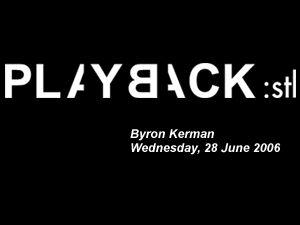Medea - Playback STL
 Expectations were running high for Medea , the first production from the upstart Orange Girls company since they snagged a bunch of Kevin Kline Awards for last year's brilliant staging of pioneer drama Going to See the Elephant . And from start to finish, Medea was heavy-like eating a plateful of pancakes, and then, for good measure, another plateful. And then, some biscuits and gravy. And possibly a funnel cake. And a milkshake. Heavy, heavy, heavy.
Expectations were running high for Medea , the first production from the upstart Orange Girls company since they snagged a bunch of Kevin Kline Awards for last year's brilliant staging of pioneer drama Going to See the Elephant . And from start to finish, Medea was heavy-like eating a plateful of pancakes, and then, for good measure, another plateful. And then, some biscuits and gravy. And possibly a funnel cake. And a milkshake. Heavy, heavy, heavy.
It wasn't heavy, though, because Medea is the story of a witchy woman who kills her own children to spite the husband who left her. It was heavy because the director shoved this power-of-myth fare down the audience's collective gullet again and again and again and again, leaving us nary a moment to breathe. Subtlety-of any kind-in gesture, in line, in expression, was rare. Passion without reprieve kind of starts to feel like baseball on steroids. Another home run? How 'bout that. Wow. Yep.
A woman left by her schmuck of a husband is entitled to emote. A Greek myth has every right to be larger than life. But this drama, crashing as it did through the audience's sensibilities again and again, over and over, was not so much pain conveyed as bombast endured.
Medea begins with shouting and ends with sorrow. In between, Brooke Edwards wails and keens and curses and spits as the wronged Medea. Jason (Joel Lewis), the fella who left her for a princess, split from Medea before the action of the play, which means that all the piss and vinegar is one long, drawn-out reaction. It's all about the past, an old passion that we are encouraged to care about by the despair and horror of its absence. We get 80 minutes of moaning for something we never knew, and it never really starts to click.
But of course, Medea is not a modern play. Notions of plot and character and catharsis have no place in this most ancient of dramas. This is Medea ! See her pound her chest and wail! Watch her rip her garments and collapse from grief! See the fire in her eye as she plots the foulest of deeds. Medea is a myth, complete with evil king, beautiful princess and Greek chorus.
The conceit here, though, is that the Orange Girls have given Medea contemporary costuming and sets to express the timelessness of a woman wronged. Medea may be a witch living at the dawn of recorded civilization, but a woman left for a younger girl is gonna fantasize about murder, regardless of the era in which she finds herself.
This updated translation of Medea is more accessible than older ones, but it's still dense poetry, and it does not flow smoothly into the mind. As with Shakespeare or Archibald MacLeish's J.B., for instance, listening to this speechifying-as-verse is work, and best understood by reading the text (several times, even) to prepare for the experience.
The stilted language and the stuck-on-11 intensity of the night ran headlong into the modern dress and back-porch set, and like the coupling of Medea and Jason themselves, it was a less-than-successful marriage.
On occasion, the actors broke through to the audience. At one point, Medea confronts Jason, alternately kissing and slapping him. The lingering bonds between two former lovers, the sore love and the unremitting anger-here, the classic is updated, and it works. Later, no one could deny the power of Medea picking up her wet, dead children (Hal Matthews and Easton Culver) from a purple-plastic kiddie pool, depositing them inside an empty refrigerator box, and sealing it with packing tape. This climax, so intense, would have benefited immeasurably from more judicious pacing earlier in the play.
The chorus is comprised of two gals from the neighborhood (Michelle Hand and Meghan Maguire). Their commentaries to us and advice to the other characters lack the majestic power that a Greek chorus has, simply because there are only two of them. It just doesn't work.
The glassed-in porch, in which we can see Medea smoking, drinking wine, and watching bad TV, acts as a set-within-a-set. Medea slumps and cries in her onstage cage-it's clever. The atmospheric, creepy music, composed by Brian Beracha, is a nice touch.
A woman left by her schmuck of a husband is entitled to emote. A Greek myth has every right to be larger than life. But this drama, crashing as it did through the audience's sensibilities again and again, over and over, was not so much pain conveyed as bombast endured.
See the review at Playback STL
Byron Kerman
June 28, 2006